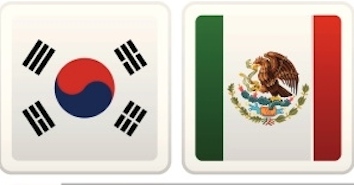After 54 years of diplomatic relations, Mexico and South Korea agreed to establish talks to finalize a Free Trade Agreement (FTA), which would have a potential market of 50 million people, in the sense that commercial exchanges have passed from $ 4 billion in 2000 to $ 17.5 billion in 2015.
In 2005, a joint report by Mexico and South Korea, carried out by officials, academics, and businessmen, left open several alternatives to increase trade and investment flows, including a FTA, sector agreements, a bilateral opening or a Trade Agreement. Economic Association (AAE, which would include topics such as cooperation).
In Mexico, sectors such as electronics, agriculture and food are in favor of an FTA, but the National Chamber of the Iron and Steel Industry (Canacero) and the Mexican Association of the Automotive Industry (AMIA) asked the Ministry of Economy was left out of the negotiations in past attempts.
After they suspended the negotiation process in June 2006 for lack of agreement on the positions presented by both countries. Both delegations held a first meeting on the disciplines and texts that will be included in a possible commercial agreement. Among the topics analyzed are access to markets, customs procedures, sanitary and phytosanitary measures, investment and services. An eventual free trade agreement is expected to help expand the economic benefits of both nations. These negotiations also seek to promote the strategy of Mexico and South Korea in Asia and America to strengthen the bilateral strategic and political association, as well as contribute to the creation of an environment conducive to business.
Trade between Mexico and South Korea has had a satisfactory evolution in recent years. In 2006, commercial exchange reached more than 11 billion dollars, 65 percent higher than that registered in the previous year. Mexico's exports to South Korea have grown 28 percent, well above the average of 19 percent for total Korean imports from other countries.
Approximately 85 percent of exports from the Asian country are intermediate goods for manufacturing, most of which are incorporated into products from sectors such as electronics or information technology, to later be exported.





